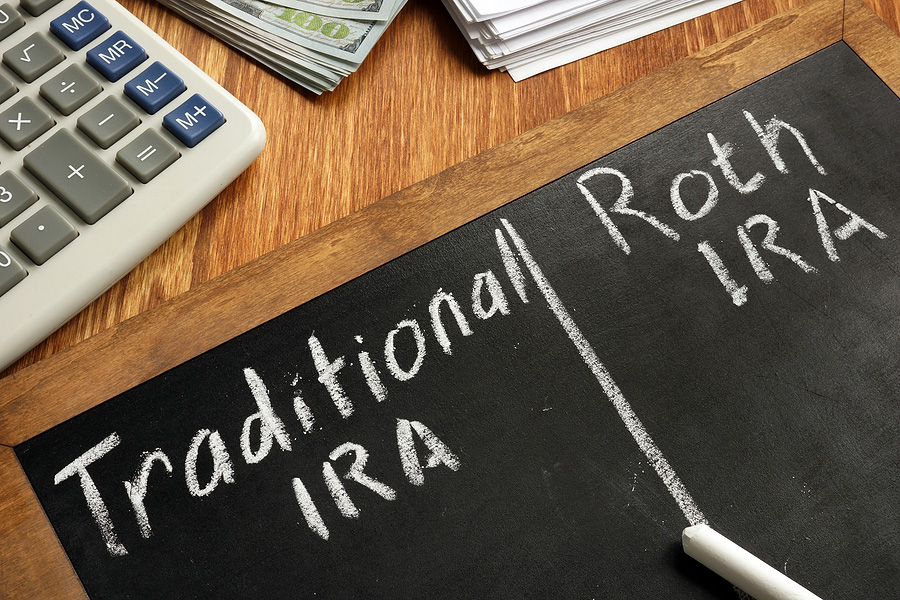IRA Contribution Limits for American Expats
November 22, 2023 | Investing, Retirement | 4 minute read
Expat Tax Blog. Tax Tips for US Americans abroad.
Updated December 27, 2024
 All blogs are verified by Enrolled Agents and CPAs
All blogs are verified by Enrolled Agents and CPAs
Updated December 27, 2024

Expat IRA Basics
IRA, or Individual Retirement Arrangements, offer U.S. citizens, whether at home or abroad, a means to save for retirement. Setting up an account with a financial institution allows tax-free or tax-deferred contributions. For expats, careful investment choices are vital, as the success of IRA contributions depends on prudent decision-making to optimize retirement savings.
There are three main types of IRA accounts:
- Traditional: This is when you make monetary contributions you can deduct on your tax return. Plus, any earnings you do make can potentially become tax-deferred (taxed at a lower rate) until you take them out of your retirement account.
- Roth: You can make monetary contributions that already had taxes paid (ie: after tax). From this, your earnings and withdraws can potentially be tax-free (as long as you meet certain conditions).
- Rollover: Monetary contributions are “rolled over” from an old (employer-sponsored) retirement plan, into a traditional IRA. For this account you can fold your tax-deferred status of assets from retirements without having early withdrawal penalties, or pay current taxes. There are other rollover types as well including traditional IRA to roth IRA, etc.
The IRS provides more information about IRAs. You can also watch MyExpatTaxes CEO as she walks you through the basics in the video below!
Why Is It Useful to Help Save for Retirement
Saving for retirement as an American abroad by having an IRA helps with financial security for your future. As you are coming into retirement you know you will have money to live off of, due to your efforts in early investing.
By saving for retirement through an IRA account, you don’t have to depend solely on Social Security. The design was actually not to be something a person totally depends on, and it can only replace 40% of the average income of a wage earner after retiring. Generally, with having Social Security, you’ll have to come up with approximately 60% of the income you need to live comfortably (after retiring).
Additionally, many parents don’t want to live with their children when they retire. It can be a reality if you don’t have enough in retirement. Plus, the compounding effect gained from your investment into an IRA, among other investments, will most likely provide a comfortable retirement.
What Are IRA Contribution Limits
After all of this, the IRS does limit the amount of contributions you can make to your IRA account. This is to prevent workers who receive higher pay than the average worker from receiving more benefits due to the tax advantages they are provided.
Each contribution limit depends on the age and type of plan the participant chooses. It also can depend on how much the person earns.
For 2024, your total contributions to all of your traditional and Roth IRAs cannot be more than:
$7,000 ($8,000 if you’re age 50 or older), or your taxable compensation for the year, if your compensation was less than this dollar limit.
The IRA contribution limit does not apply to Rollover contributions and Qualified reservist repayments.
Source: IRS.gov – Retirement Topics – IRA Contribution Limits
Compensation
When determining how much your expat IRA contribution can be, first consider what the IRS considers compensation. Compensation from the IRS means whatever you earn from working. Check out this IRS chart below of what compensation includes/does not include:
Compensation for Purposes of an IRA
What is included in compensation:
- Wages, salaries, etc
- Commissions
- Self-employment income
- Taxable alimony and separate maintenance
- Non-taxable combat pay
What it does not include in compensation:
- Earnings and profits from property
- Interest and dividend income
- Pension or annuity income
- Deferred compensation
- Income from certain partnerships
- Any amounts you exclude from income
How to Calculate Taxable Compensation for IRA Limit
To determine your expat IRA contribution limit, you’ll need to look at your filing status, taxable compensation, and adjusted gross income (AGI). From these three factors, you are either eligible for the maximum amount, a reduced amount or not eligible at all. Check out this calculation from TIAA to see how much you can contribute.
Keep in mind that when you use FEIE (Foreign Earned Income Exclusion), this might mean that ALL of your compensation is excluded from US taxation; therefore, you have $0 in taxable compensation. Read below for more information.
Using Foreign Tax Credit instead of FEIE to help you contribute
It is possible for US expats to be eligible to use the FEIE (Foreign Earned Income Exclusion) when owning an IRA account. But here are two things to be aware of:
- As an expat, IRA contributions can still be made if not all your eligible compensation (as defined by the IRS in the chart above) is excluded by FEIE
Examples:
a) With $6,000 of US-sourced salaried income and $50,000 of foreign-sourced net business income excluded using the FEIE, only the $6,000 US income factors into eligibility for contributions to certain tax benefits, like retirement accounts. Understanding these distinctions is essential when managing a combination of US and foreign income for tax purposes.
b) You make $130,500 equivalent of foreign salaried income in tax year 2024. You use the max FEIE amount of $126,500 against your foreign income. As a result, you will have $4,000 of foreign taxable compensation left over to help you be eligible to contribute to your IRA. - It makes you, as a US citizen abroad, ineligible to contribute to an IRA account if you exclude all your eligible compensation and have no additional sources of eligible compensation. Keep in mind investment, rental and other typically passive income sources are not considered eligible compensation when determining your contribution limits.
Working with an ROTH IRA and FEIE
You may need to calculate your modified adjusted gross income when you contribute to a ROTH IRA. This calculation will add back FEIE and/or a foreign housing exclusion you claimed in the tax year to ensure you are not understating your AGI.
For single American expat filers, your Roth IRA contribution starts at a modified AGI of $218,000. Those when a modified AGI is $228,000 or more you cannot make any deductions. Make sure you check out all the different scenarios concerning modified AGIs.
Using the FTC instead of FEIE
It may be more beneficial to claim the FTC (Foreign Tax Credit) since it can bring better results than the FEIE and still allow you to contribute as an American abroad.
When you claim the Foreign Tax Credit, you will declare your net, self-employment income, or wages as taxable. Both will give you the opportunity to open up and contribute to an IRA account in the US. Plus, the Foreign Tax Credit gives a tax reduction in the United States from any tax amount paid to the country you work and/or reside in, so it can still eliminate your US tax liability to $0 as FEIE would normally do.
MyExpatTaxes & Your Expat IRA Contribution
Do you need more assistance figuring out what is the best investment account for you? We serve US citizens, and Green Card holders abroad too. Start filing with us through our expat tax software, or contact our team for more info. Our knowledgeable team will assist you on the right path.

Written by Nathalie Goldstein, EA
Nathalie Goldstein, EA is a leading expert on US taxes for Americans living abroad and CEO and Co-Founder of MyExpatTaxes. She contributes to Forbes and has been featured in Forbes, CNBC and Yahoo Finance discussing US expat tax.
November 22, 2023 | Investing, Retirement | 4 minute read






